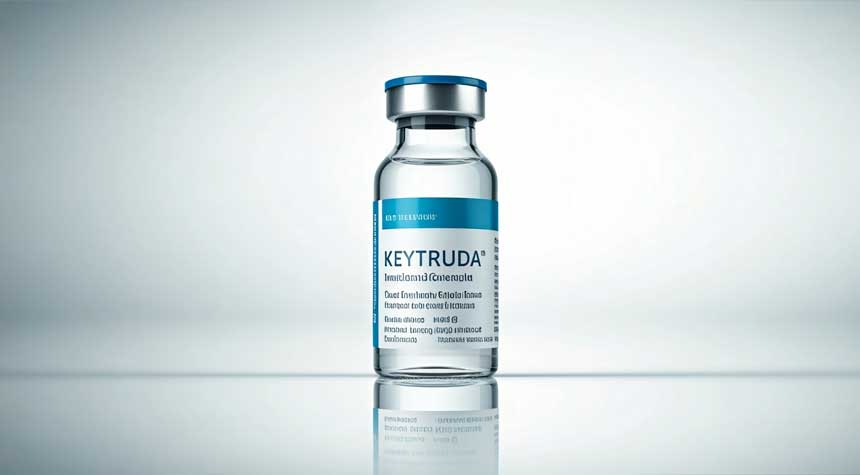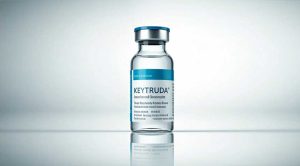
Merck’s Injectable Version of Blockbuster Cancer Therapy Keytruda Approved by U.S. FDA
The U.S. Food and Drug Administration (FDA) has approved a new formulation of Keytruda (pembrolizumab), Merck’s blockbuster cancer medication.
The new version, Keytruda Qlex (pembrolizumab and berahyaluronidase alfa-pmph), can be injected subcutaneously, unlike the original Keytruda, which is administered intravenously.
The new version of Keytruda represents a significant advancement in how a top-selling cancer immunotherapy can be administered, which could enhance both patient experience and clinical effectiveness, according to Reuters. Keytruda generated nearly $30 billion in global sales last year, Reuters reported.
In addition, Merck said in its press release that Keytruda Qlex may simplify treatment delivery for patients who do not require a port or whose veins are difficult to access.
“At Merck, we are committed to putting patients first, as we work relentlessly to discover new options that may help patients manage their treatment in a way that fits their needs,” Dr. Marjorie Green, senior vice president and head of oncology, global clinical development, Merck Research Laboratories, said in a press release.
Patients taking Keytruda Qlex will have shorter clinic visits since the new version can be delivered in as little as one or two minutes, depending on the dosage, compared to Keytruda’s original intravenous (IV) infusion, which typically takes about 30 minutes, according to Nancy Ibach, associate vice president of U.S. Oncology at Merck.
The recommended dosage of the injection is either 395 mg every three weeks or 790 mg every six weeks, according to Merck. In addition, Keytruda Qlex is injected under the skin, either in the thigh or abdomen.
The FDA approved the new Keytruda formulation in September for use in both adults and pediatric patients (aged 12 and older), as well as for treating most of the same cancers as the original Keytruda IV version.
What Is Keytruda?
Keytruda is not chemotherapy or radiation therapy, but an immunotherapy that works with the immune system to help fight certain cancers, according to Merck.
Keytruda, approved by the FDA in 2014, belongs to a class of medicines called immune checkpoint inhibitors, which help the immune system recognize and attack cancer cells. Keytruda is used to treat multiple cancers, including bladder and urinary tract cancer, kidney cancer, triple-negative breast cancer, non-small-cell lung cancer, cervical cancer, head and neck cancer, and melanoma.
Keytruda Qlex has been approved to treat most of the same cancers as the original IV Keytruda. Merck noted that this is the first time an immune checkpoint inhibitor has been approved for subcutaneous (under-the-skin) use across so many cancer types.
FDA Notes Keytruda Qlex Clinical Trial
In approving the new version of Keytruda, the FDA noted a late-stage clinical trial comparing Keytruda Qlex with IV Keytruda.
The trial involved 377 participants with stage 4 metastatic non-small cell lung cancer who were randomly assigned to take either Keytruda Qlex or the original IV form of Keytruda in combination with platinum doublet chemotherapy.
The tumors of 45 percent of participants shrank after receiving Keytruda Qlex, compared with 42 percent who received the original Keytruda IV form. The results showed that the new Keytruda formulation was comparable to the IV formulation. Additionally, no significant differences were observed between the two groups in terms of the duration of cancer-free status and overall survival.
The most common adverse reactions of trial patients who received Keytruda Qlex along with chemotherapy were nausea, fatigue, and musculoskeletal pain.
Healthcare Providers React to Keytruda Qlex
Keytruda Qlex, as well as the original IV Keytruda, must be administered by a healthcare provider, Merck said.
Doctors say Keytruda Qlex offers healthcare providers a new option that works just as well as the original Keytruda in fighting cancer.
“This approval is significant for patients and health care providers like me who have been using immunotherapies for years to treat certain cancers,” Dr. J. Thaddeus Beck, oncologist and Medical Director of the Arkansas-based Highlands’ Clinical Trials Office, said in a press release.
Not only does Keytruda Qlex provide faster administration than Keytruda and offer two dosing options, Dr. Beck said the new version “gives patients more choices of health care settings in which they can receive their therapy.”
Merck states that healthcare professionals can administer Keytruda Qlex in various settings, including a doctor’s office, an infusion center, or a local community-based clinic. This provides more opportunities for patients to spend less time receiving their treatment.
“That’s important for busy infusion centers and for patients juggling work and family,” Dr. Pavlos Msaouel, an associate professor at the University of Texas MD Anderson Cancer Center in Houston, told Everyday Health.
Convenience may be a reason for some cancer patients to choose Keytruda injections, but others may not see it as a more effective option, Dr. Msaouel observed. For example, patients who are required to receive chemotherapy infusions may want to continue receiving Keytruda at infusion centers, Dr. Msaouel said. These patients can receive Keytruda infusions at the same time as chemotherapy infusions, so that Keytruda shots do not reduce their total treatment time, Dr. Msaouel noted.
Merck expects the “peak adoption” of Keytruda Qlex to reach 30-40% of patients on Keytruda within two years, Reuters reported. Merck is the third drug company to bring a subcutaneous cancer therapy to market, following Roche’s Tecentriq Hybryza and Bristol Myers Squibb’s Opdivo Qvantig, according to Reuters.
Source Links:
https://www.reuters.com/business/healthcare-pharmaceuticals/us-fda-approves-mercks-new-injectable-version-keytruda-2025-09-19/
https://www.merck.com/news/fda-approves-mercks-keytruda-qlex-pembrolizumab-and-berahyaluronidase-alfa-pmph-injection-for-subcutaneous-use-in-adults-across-most-solid-tumor-indications-for-keytruda-pem/
https://www.fda.gov/drugs/resources-information-approved-drugs/fda-approves-pembrolizumab-and-berahyaluronidase-alfa-pmph-subcutaneous-injection
https://www.everydayhealth.com/cancer/blockbuster-cancer-drug-keytruda-now-available-as-time-saving-shot/







